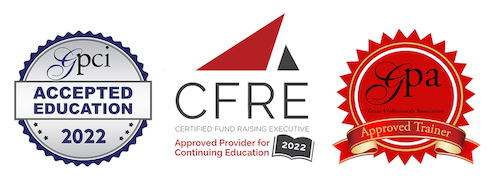Live Trainings

- This event has passed.
LIVE WEBINAR: Grants 301 – Logic Models and Theories of Change
September 14, 2022 @ 12:00 pm - 1:00 pm
$50Grants 301: Logic Models and Theories of Change
Session 4 of the Grants 301 Series
While traditional philanthropy focused on funding immediate needs and short-term goals, the practice of philanthropy is taking a turn towards social change. Funders desire to fund change, not charity. In this way, philanthropy can more effectively address issues at their root causes.
Theories of change provide an opportunity for funding organizations to develop and articulate the underlying beliefs and assumptions that guide their philanthropic giving. By connecting to your field’s theory of change, organizations that apply for funding can examine their service delivery and share how these services are critical for producing social change.
In this webinar, presenter Julie Assel, GPC guides participants through the essential elements of theories of change, strategies for tailoring the theories of change to the funders’ missions, and specific questions to guide an organization’s development of a theory of change.
What You’ll Learn:
- What theories of change are;
- How they are similar to and different from logic models;
- How and why funders are using logic models and theories of change;
- How grant writers can and should be looking at funders’ theories of change; and
- How organizations and grant writers should be creating theories of change for their organizations and large collaborative community projects.
CEUs
This training aligns with the Grant Professional Certification Institute’s Competencies and Skills and is approved for 1.0 Continuing Education Unit (CEU). Full participation in this training is also applicable for 1.0 points in Category 1.B – Education of the CFRE International application for initial certification and/or recertification.
GPC Competencies:
Competency 1: Knowledge of How to research, identify, and match funding resources to meet specific needs:
- Skill 1.1 – Identify major trends in public funding and public policy.
- Skill 1.6 – Identify effects of applicants’ organizational cultures, values, decision-making processes, and norms on the pursuit of grant opportunities.
- Skill 1.8 – Determine best matches between funders and specific programs.
Competency 2: Knowledge of organizational development as it pertains to grant seeking:
- Skill 2.4 – Identify methods for assisting organizations to implement practices that advance grant readiness.
- Skill 2.5 – Identify values, purposes, and goals of fund-seeking entities’ overall strategic plans in the grants process.
- Skill 2.6 – Identify methods of conducting mission-focused planning and needs assessments with applicant organizations.
Competency 3: Knowledge of strategies for effective program and project design and development:
- Skill 3.4 – Identify structures, values, and applications of logic models as they relate to elements of project design.
- Skill 3.5 – Identify appropriate definitions of and interrelationships among elements of project design (e.g., project goals, objectives, activities, evaluation).
Length: 60 minutes
Presented By: Julie Assel, GPC, President/CEO Assel Grant Services

